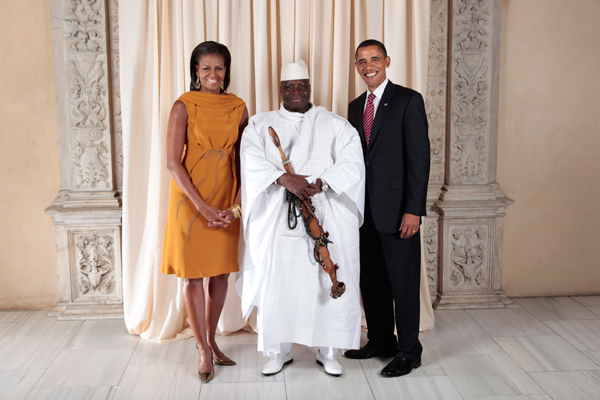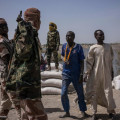Tiny Gambia and the absurdity of its regime
In 2014 and 2015 the number of asylum applications from Gambian nationals in the European Union reached figures as high as 11,500 (to be specific, 11,465 in 2015 and 11,515 in 2014. Eurostat data). Of course, when compared with the astonishing numbers of Syrians, Afghans and Iraqis looking for peaceful shelter in the EU, the Gambia looks like the mouse next to the elephant. But this perception needs reconsideration, for the state of the Gambia only amounts to 1,849,000 inhabitants. What are the causes of such exodus from the tiny West African state?
At the end of December 2014, a handful of Gambian American immigrants attempted a coup to overthrow the authoritarian government of Yahya Jammeh, the man who has been ruling the country since 1994, at times with absurd propaganda including his claim to be a natural healer capable of curing AIDS. The failure of the coup didn’t just deny the opportunity to topple the old President, it strengthened his power by demonstrating his backing from the United States and that, with such a powerful international actor behind him, he is quite impossible to overthrow. In fact, the US establishment agreed to prosecute the two Gambian American promoters of the coup according to a piece of legislation called the Neutrality Act, which forbids US citizens from participating in private military operations against “friendly nations”; several American human rights advocacy officials raised their eyebrows at the decision.
Amnesty International reports of a fierce deterioration in human rights after the attempted coup in December 2014. In 2015, Sabrina Mahtani, Amnesty’s West Africa researcher, claimed that “the climate of fear which has blighted the lives of Gambians for more than two decades has worsened over the last 12 months with journalists, people perceived as gay or lesbian, and those considered to be opponents of the regime and their families being increasingly targeted”. Since January 2015, many Gambians suspected of supporting the coup were arrested and detained incommunicado. This threw their families into situations of great insecurity, culminating with the arrest and detention of members of such families, including women, children and elders. Some detainees were victims of torture including beatings, electric shocks or being detained in holes in the ground.
Freedom of expression and freedom of assembly are also severely affected by the incumbent government’s measures: journalists and human rights defenders are apprehended and detained regularly, as well as musicians who use their music to conduct political opposition (as in the case of rapper Killa Ace who fled Gambia after receiving death threats following the release of a song that accused the government of repression and extrajudicial executions). Gathering in assemblies and strikes is also a dangerous act for Gambians, as the military and the police often burst into such events arresting and incarcerating leaders and participants.
The government’s clampdown on human rights concerns also groups of citizens not directly involved – or alleged not to be so – with the coup. It’s the case, for example, with people suspected of homosexual acts, which the government legally calls “unnatural acts”. In November 2014, Gambia introduced the death penalty for those accused of “aggravated homosexuality”.
Still wondering why so many young Gambians come to Europe seeking asylum?



